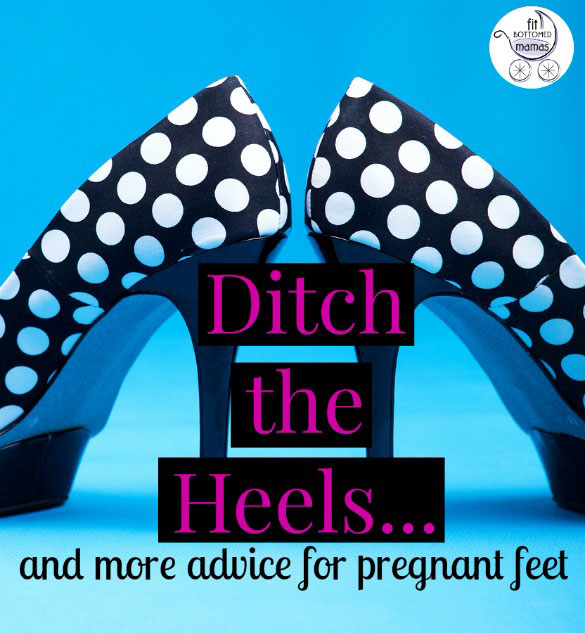Ditch the Heels … and More Friendly Advice for Pregnant Feet
When you’re pregnant, you grow accustomed to the aches and pains that come along with a belly that throws off your center of gravity and extra weight that strains your entire body. But pregnancy affects your entire body, from the hair on your head — that falls out in fistfuls postpartum — to the soles of your feet. That sneaky hormone relaxin, which can be to blame for lots of pain (like my achey-breaky pelvis), its effects aren’t restricted to the pelvic region, according to Terry Mitchell, the medical director for comfy-shoe maker Vionic. Relaxin relaxes muscles, ligaments and tendons to prepare for the birth — and even your feet may suffer the consequences. Read on for Mitchell’s recommendations for pregnancy footwear (spoiler: Those heels may not be doing you any favors!)

What kind of shoes do you recommend for pregnancy? During pregnancy there is significant weight gain in a short time, not to mention a change in your center of gravity, both of which alters and increases the forces through the feet. In addition, the body releases relaxin, designed to relax muscles, ligaments and tendons to prepare for the birth. However, the effect of these chemicals is not restricted to the pelvic region! It is important to wear comfortable and supportive footwear that can assist in preventing foot discomfort. Vionic’s podiatrist-designed footwear provides science-infused style to stay comfortable and supported.
What shoes should be no-gos during pregnancy? Are heels OK? Flip-flops? Why/why not? Heels are no-gos as they unevenly distribute weight in your feet, pushing more force onto the ball of the foot and the toes. Likewise, flats or flip-flops that have no support can adversely affect your feet during pregnancy. Make sure your flats or flip-flops have built-in support that contour to the foot to protect it from overpronation (rolling inwards too far) and collapsing the arch.
Is it common for your feet to grow during pregnancy? And will they ever revert back to their original size? Biomechanically your feet tend to lengthen as the arch collapses and the toes will “spread” due to a more pronated position, making your feet look and feel wider. We typically walk on hard, flat unnatural ground that has no “give,” which requires our feet to often overcompensate to absorb the shock of impact. In turn, this collapses the arch, elongating the foot and placing additional stress on the plantar fascia (a primary contributor to heel pain). Walking barefoot after periods of rest such as trips to the bathroom during the night or upon rising first thing in the morning can also place additional tension on the plantar fascia. Post pregnancy, continuing to wear supportive footwear will assist in maintaining your arch and prevent your foot from lengthening and spreading.
What can be done to prevent foot pain during pregnancy? Wear a supportive shoe and regularly perform some leg and foot stretching exercises. Having supportive footwear such as an orthotic sandal or slipper by your bedside will assist during the night when your feet are most vulnerable: when standing after resting. In taking those first steps of the day, damage can occur after hours of not bearing weight while you sleep.
Wear orthotic foot support whenever you are standing! You do not have to be walking or running to suffer from collapsed arches. If you do have heel pain, the most important element in repairing damage to your feet is to be supported whenever you are standing. Whenever you stand or walk without support and feel pain, it’s an indicator that you have damaged your soft tissue. Vionic has a range of styles, including supportive wedges, if you need to wear a heel that can support your body adequately while still giving you the stylish edge you want.
Are there any exercises that are good for the feet? Rolling your barefoot over a cold soda can will provide both stretching and cold compression. You may also roll your feet out on a tennis ball. Soaking the ball in warm water to soften hard skin can be useful and also feels great! There are any number of plantar fascia and general foot stretches and exercises available online to assist in improving your comfort.
A big thanks to Vionic for a) its comfy shoes and 2) providing us more insight on foot health during pregnancy. All the more reason to get those partners massaging those feet, right?
Did you give up the heels during pregnancy? I haven’t worn a heel in AGES, but I’m guilty as charged when it comes to flip-flops…. —Erin
